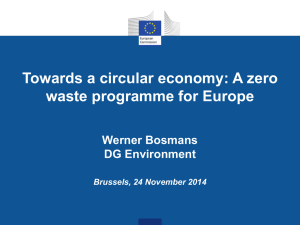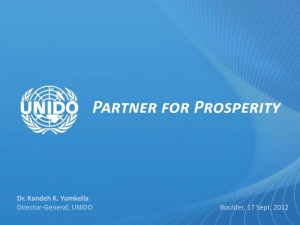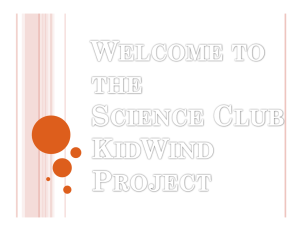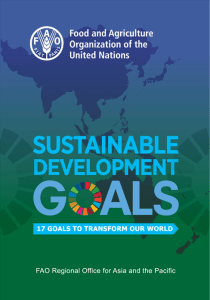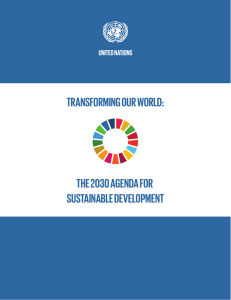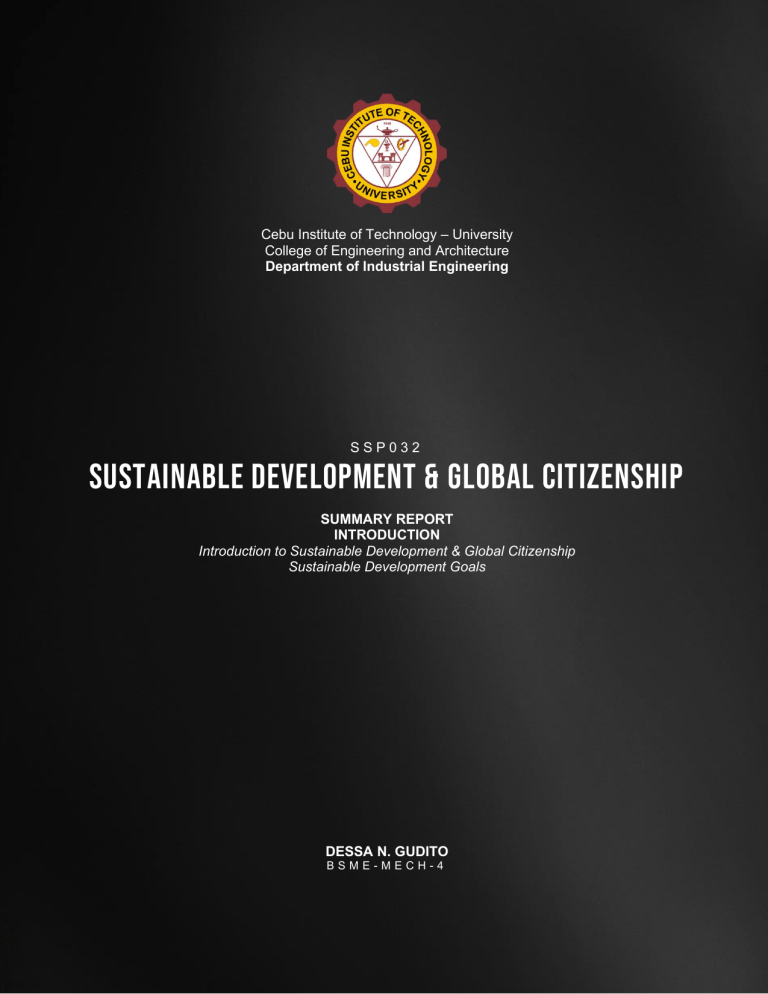
Cebu Institute of Technology – University College of Engineering and Architecture Department of Industrial Engineering SSP032 SUSTAINABLE DEVELOPMENT & GLOBAL CITIZENSHIP SUMMARY REPORT INTRODUCTION Introduction to Sustainable Development & Global Citizenship Sustainable Development Goals DESSA N. GUDITO BSME-MECH-4 ACTIVITY 2 S US TA IN AB LE D E V E LO P M E NT G O AL S End poverty in all its forms everywhere. It seeks to remove poverty and inequality within and among nations. By 2030, eradicate extreme poverty for all people everywhere, currently measured as people living on less than $1.25 a day; and reduce at least by half the proportion of men, women and children of all ages living in poverty in all its dimensions according to national definitions. End hunger, achieve food security and improved nutrition and promote sustainable agriculture. By 2030, end hunger and ensure access by all people, end all forms of malnutrition double the agricultural productivity and incomes of small-scale food producers, and ensure sustainable food production systems. By 2020, maintain the genetic diversity of seeds, cultivated plants, and farmed and domesticated animals. Ensure healthy lives and promote well-being for all at all ages. By 2030, reduce the global maternal mortality ratio, end preventable deaths of newborns and children, end the epidemics, reduce by one third premature mortality, strengthen the prevention and treatment of substance abuse, ensure universal access to sexual and reproductive health-care services, and achieve universal health coverage. By 2020, halve the number of global deaths and injuries from road traffic accidents Ensure inclusive and equitable quality education and promote lifelong learning opportunities for all. It addresses the need for girls and boys to have equal access to high quality education at all levels, from pre-primary through to tertiary and to develop the vocational skills needed for employment. By 2020, substantially expand globally the number of scholarships available to developing countries. By 2030, substantially increase the supply of qualified teachers. Achieve gender equality and empower all women and girls. It seeks to end discrimination and violence against women and girls by addressing the barriers that exist to gender equality. Eliminate all harmful practices, value unpaid care and domestic work, ensure women’s full and effective participation and equal opportunities for leadership, and ensure universal access to sexual and reproductive health. Ensure availability and sustainable management of water and sanitation for all. By 2030, achieve universal and equitable access to safe and affordable drinking water, sanitation, and hygiene for all, improve water quality, substantially increase water-use efficiency, implement integrated water resources management, and protect and restore water-related ecosystems. Ensure access to affordable, reliable, sustainable, and modern energy for all. By 2030, ensure universal access to affordable, reliable, and modern energy services, increase substantially the share of renewable energy, and double the global rate of improvement in energy efficiency. Promote sustained, inclusive, and sustainable economic growth, full and productive employment, and decent work for all. Sustain per capita economic growth in accordance with national circumstances, achieve higher levels of economic productivity, promote development-oriented policies, improve progressively, through 2030, global resource efficiency, and protect labor rights and promote safe and secure working environments. Build resilient infrastructure, promote inclusive and sustainable industrialization and foster innovation. Develop quality, reliable, sustainable, and resilient infrastructure, promote inclusive and sustainable industrialization, Increase the access of small-scale industrial and other enterprises, upgrade infrastructure and retrofit industries, and enhance scientific research. Reduce inequality within and among countries. By 2030, progressively achieve and sustain income growth of the bottom 40 per cent of the population, empower and promote the social, economic and political inclusion of all, ensure equal opportunity, Improve the regulation and monitoring of global financial markets, ensure enhanced representation and voice for developing countries, and facilitate orderly, safe, regular and responsible migration and mobility of people Make cities and human settlements inclusive, safe, resilient, and sustainable. By 2030, ensure access for all to adequate, safe, and affordable housing, transport systems, and urbanization, strengthen efforts to protect and safeguard the world’s cultural and natural heritage, reduce the adverse per capita environmental impact of cities, and provide universal access to safe, inclusive and accessible, green and public spaces. Ensure sustainable consumption and production patterns. Implement the 10-Year Framework of Programs on Sustainable Consumption and Production Patterns. By 2030, achieve the sustainable management and efficient use of natural resources, substantially reduce waste generation, and promote sustainable public procurement practices. By 2020, achieve the environmentally sound management of chemicals and all wastes. Take urgent action to combat climate change and its impacts. Strengthen resilience and adaptive capacity to climate-related hazards and natural disasters in all countries. Integrate climate change measures into national policies, strategies, and planning. Improve education, awareness-raising and human and institutional capacity on climate change mitigation, adaptation, impact reduction and early warning. Conserve and sustainably use the oceans, seas, and marine resources for sustainable development. By 2025, prevent and significantly reduce marine pollution. By 2020, sustainably manage and protect marine and coastal ecosystems, minimize and address the impacts of ocean acidification and destructive fishing practices, and conserve at least 10 per cent of coastal and marine areas. By 2030, increase the economic benefits to small island developing States and least developed countries. Protect, restore, and promote sustainable use of terrestrial ecosystems, sustainably manage forests, combat desertification, and halt and reverse land degradation and halt biodiversity loss. By 2020, promote the implementation of sustainable management of all types of forests. By 2030, combat desertification, ensure the conservation of mountain ecosystems, end poaching and trafficking of protected species. Promote peaceful and inclusive societies for sustainable development, provide access to justice for all and build effective, accountable, and inclusive institutions at all levels. Significantly reduce all forms of violence and related death rates, end abuse, exploitation, trafficking and all forms of violence, promote the rule of law at the national and international levels and ensure equal access to justice for all, develop effective, accountable and transparent institutions at all levels, and broaden and strengthen the participation of developing countries in the institutions of global governance. Strengthen the means of implementation and revitalize the Global Partnership for Sustainable Development. For finance, it seeks to strengthen domestic resource mobilization and additional financial resources for developing countries. For technology, it aims to promote the development, transfer, dissemination, and diffusion of environmentally sound technologies. For capacity building, enhance international support for implementing effective and targeted capacity-building in developing countries. Promote a universal trading system. Lastly, enhance systemic issues on policy and institutional coherence, multi-stakeholder partnerships, and data, monitoring and accountability. ACTIVITY 4 “ As a stud ent , h ow ca n you b ec om e a gl oba l cit iz en?” A global citizen is an individual who is aware of the world and has a sense of their role in it. As a student, I can become one by studying this course, GCED, and by doing GCED as well. Grow. Collaborate. Educate. Do. Grow by gaining knowledge, gathering information, or grasping the realities that the world is facing right now. In this way, we do not only grow to become citizens of our own countries, but we grow to become citizens of the world. As students, we ready ourselves as we face the real world outside the four walls of the classroom by learning. We must be aware so that we may know how to carry ourselves independently in this world, and so that we will know how to respond to the situations of other people and of the world. Collaborate with others without a hint of discrimination. Despite the language and cultural barriers that we encounter when we communicate with others, we must learn that “Alone, we can do so little; together, we can do so much” - quoting Helen Keller. As students, we can participate in movements and causes by joining organizations. In this way, we practice collaboration by working with different people to achieve the same goal in mind. There are organizations such as UNESCO, DOST Patriot Scholars in different sectors, and many more whose goal is to provide service to the Filipino community and the world. When we have a heart to serve others, to our fellow countrymen at the very least, we can easily empathize with other people in the world as well. In this way, our concern for others establishes a connection despite the distance and all the barriers. It is the very essence of humanity – caring for others and for the world that we live in. Educate others. We must echo what we have learned to others especially our fellow youth, because we are the next ones in line. When it is our turn to become leaders or our families, communities, maybe even in our own country, we can do so much when we empower each other and elevate those who are in the state of ignorance. It is the best output that we can do as students because the most effective way to know if you have learned something is when you are able to share your knowledge with others by teaching them. Do. As of now, we may think that we can do so little to make a change in the world. However, the small efforts that many people exert, become great collectively. We must apply what we have learned and start to take action. Also, there is no age limit in doing great things. We can do so much for the future if we start now. Who knows, maybe the sustainable development goals won’t be achieved by 2030, but earlier. I firmly believe that we must become global citizens so that we can create a better world, which is why we must learn to become one and more importantly, inspire others to become global citizens as well.
